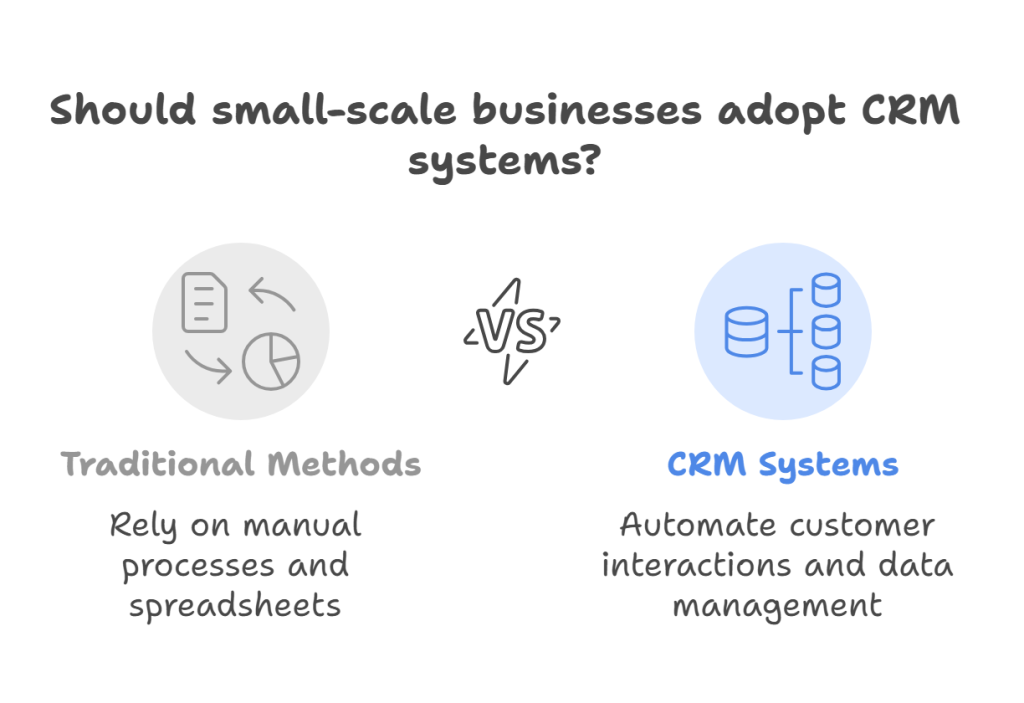Are you a small business owner constantly juggling customer information, struggling with missed follow-ups, or finding it difficult to grow without a clear, cohesive customer strategy? You’re not alone. Many small and medium-sized enterprises (SMEs) face the uphill battle of managing customer relationships manually, often leading to missed opportunities and stalled growth.
This struggle is precisely why an increasing number of small businesses are making a pivotal shift towards adopting Customer Relationship Management (CRM) systems.

In this article, we’ll explore why small-scale businesses are embracing CRM and explain why every small business owner should seriously consider implementing one to overcome these challenges, drive growth, and build lasting customer relationships.
The Challenges of Going Manual: Why Small Businesses Need a Change
Operating a small business often means wearing many hats, and managing customer interactions can quickly become overwhelming without the right tools. The “manual” approach, while seemingly cost-effective initially, often leads to significant inefficiencies and lost potential.
Disjointed Customer Information
One of the biggest pain points for small businesses is the scattering of vital customer data. Information often lives across various platforms: emails, personal notes, outdated spreadsheets, and even the individual memories of team members.
This disorganization makes it incredibly difficult to get a complete, 360-degree view of your customer. Imagine a scenario where a customer calls with a query, and the representative has no immediate access to their past purchases, previous interactions, or even their preferred contact method.
This disjointed approach leads to wasted time, frustrated employees, and, most importantly, a less-than-ideal customer experience.
Read More:- SalesForce CRM user Lists
Missed Opportunities and Inconsistent Sales
Without a centralized system, leads can easily fall through the cracks. Following up consistently becomes a monumental task, and tracking your sales pipeline feels like navigating a maze blindfolded. This translates directly to missed opportunities and inconsistent sales figures.
For instance, a promising lead might be forgotten amidst the daily whirlwind of tasks, leading to a lost sale that could have significantly impacted your bottom line. The absence of a systematic approach means you’re leaving money on the table.
Strained Customer Relationships
In today’s competitive landscape, customer satisfaction is paramount. When customer interactions are managed manually, it’s challenging to personalize communications, ensure timely responses, or provide truly proactive customer service.
This often results in strained customer relationships and increased churn. Consider a loyal customer who feels undervalued because their specific preferences or past issues aren’t remembered across different interactions with your team. Such experiences can quickly erode trust and lead to customers seeking alternatives.
Lack of Actionable Insights
Operating without a CRM means you often lack clear data on customer behavior, sales trends, or the true effectiveness of your marketing efforts. Decisions are then made based on guesswork or intuition rather than solid evidence. This limits your ability to identify growth opportunities, optimize your strategies, and scale your business effectively.
The CRM Revolution for Small Businesses: How It Transforms Operations
Recognizing these challenges, small businesses are increasingly turning to CRM systems, which offer a powerful suite of tools designed to streamline operations and foster stronger customer connections.
Centralized Customer Hub: The 360-Degree View
At its core, a CRM system acts as a centralized repository for all your customer data. This includes contact information, purchase history, communication logs, service requests, and more. This consolidation provides an immediate 360-degree view of every customer, accessible to anyone on your team, anytime.
This not only dramatically improves efficiency but also allows for truly personalized interactions. For example, a business that adopts a CRM can see an estimated 25% reduction in time spent searching for customer information, freeing up valuable time for more productive tasks.
Read More: Top 10 Companies Using Salesforce CRM
Supercharging Sales and Lead Management
For many small businesses, the sales process can be chaotic. CRM systems bring order to this chaos by providing robust lead tracking, intuitive pipeline management tools, and the ability to automate follow-ups. This leads to significantly increased conversion rates and a streamlined sales process.
Imagine how a small business can use CRM to instantly identify “hot” leads based on their engagement history and then automate initial outreach emails, ensuring no potential sale is overlooked.
Elevating Customer Service and Support
CRM empowers small businesses to deliver exceptional customer service. Features like case management and ticketing systems ensure that every customer inquiry is tracked and resolved efficiently. Faster response times and a clear history of past interactions lead to significantly enhanced customer satisfaction and, consequently,
higher customer retention. In fact, studies consistently show that a 5% increase in customer retention can lead to a 25% to 95% increase in profits.
Driving Marketing Efficiency and Personalization
Beyond sales and service, CRM systems are invaluable for marketing. They enable you to segment your customer base, allowing for highly targeted email campaigns and personalized communications. By tracking marketing ROI within the CRM, you can optimize your marketing spend and develop stronger customer engagement strategies.
For instance, a small online retailer could use CRM data to send personalized promotions for products complementary to a customer’s past purchases, increasing the likelihood of repeat business.
Data-Driven Decision Making
One of the most significant benefits of a CRM for small businesses is its ability to provide actionable insights. Through robust reporting and analytics features, you can identify customer behavior patterns, understand sales trends, and measure the effectiveness of your various initiatives.
This allows you to make informed decisions, optimize your strategies, and confidently plan for growth, moving away from guesswork and towards data-backed success.
Dispelling Myths: CRM Isn’t Just for Enterprises
A common misconception is that CRM systems are complex, expensive tools reserved only for large corporations. This couldn’t be further from the truth in today’s market.
Affordability and Scalability
Modern CRM solutions offer highly flexible pricing models, with many providers offering affordable subscription tiers specifically designed for small businesses. There are even freemium models available for those just starting out.
These systems are also inherently scalable, meaning they can grow seamlessly with your business, ensuring you’re not paying for features you don’t need initially but can easily add them as your needs evolve.
Ease of Implementation and User-Friendliness
Gone are the days of complex, on-premise CRM installations. Today, most small business CRM solutions are cloud-based, making them incredibly easy to set up and intuitive to use. They often require minimal IT expertise, allowing your team to quickly adopt and benefit from the system.
The increasing number of CRM adoption success stories among small businesses is a testament to their user-friendliness.
Read More: Pipe Drive CRM user list
Focus on Core Small Business Needs
Many CRM providers have recognized the unique needs of SMEs and have developed platforms specifically tailored to them. These systems focus on core functionalities that truly benefit small business growth, avoiding unnecessary complexity and features that are only relevant to larger enterprises.
This ensures that the investment in CRM for small businesses directly addresses their most pressing challenges.
Your Competitive Edge: Why Adopt CRM Now?
The question isn’t whether your small business can adopt CRM, but whether it can afford not to. Implementing a CRM system offers a distinct competitive advantage in several key areas.
Staying Ahead of the Curve
In an increasingly digital and customer-centric world, businesses that embrace technology gain a significant edge. By adopting a customer relationship management system, you’re positioning your small business as forward-thinking and committed to efficiency, setting you apart from competitors still relying on outdated manual processes.
Building Lasting Customer Relationships
At the heart of every successful small business are strong customer relationships. CRM fosters loyalty and advocacy by enabling personalized interactions, proactive service, and consistent engagement. This leads to higher customer retention strategies and, in turn, more sustainable and profitable growth for your small business.
Future-Proofing Your Business
As your business inevitably grows, managing an expanding customer base and increasing operational complexity will become even more challenging. A robust CRM system provides the essential infrastructure needed to scale seamlessly, ensuring you’re prepared for future expansion.
Imagine a small business expanding into new markets – a CRM system would allow them to seamlessly integrate new customer data and manage interactions without missing a beat. This ensures your business can continue to thrive, regardless of its size.
Final Thoughts
In summary, the transition of small-scale businesses towards CRM systems is not merely a trend but a strategic imperative. By centralizing customer information, streamlining sales and marketing efforts, enhancing customer service, and enabling data-driven decision-making,
CRM offers tangible benefits that directly address the pain points of growing SMEs. It’s clear that CRM is no longer a luxury but a fundamental tool for any small business aiming for sustained success and a competitive edge.
So, are you ready to unlock your business’s full potential? Don’t let manual inefficiencies hold you back any longer. Take the first step towards transforming your customer relationships and securing your business’s future – start exploring affordable CRM solutions today!
